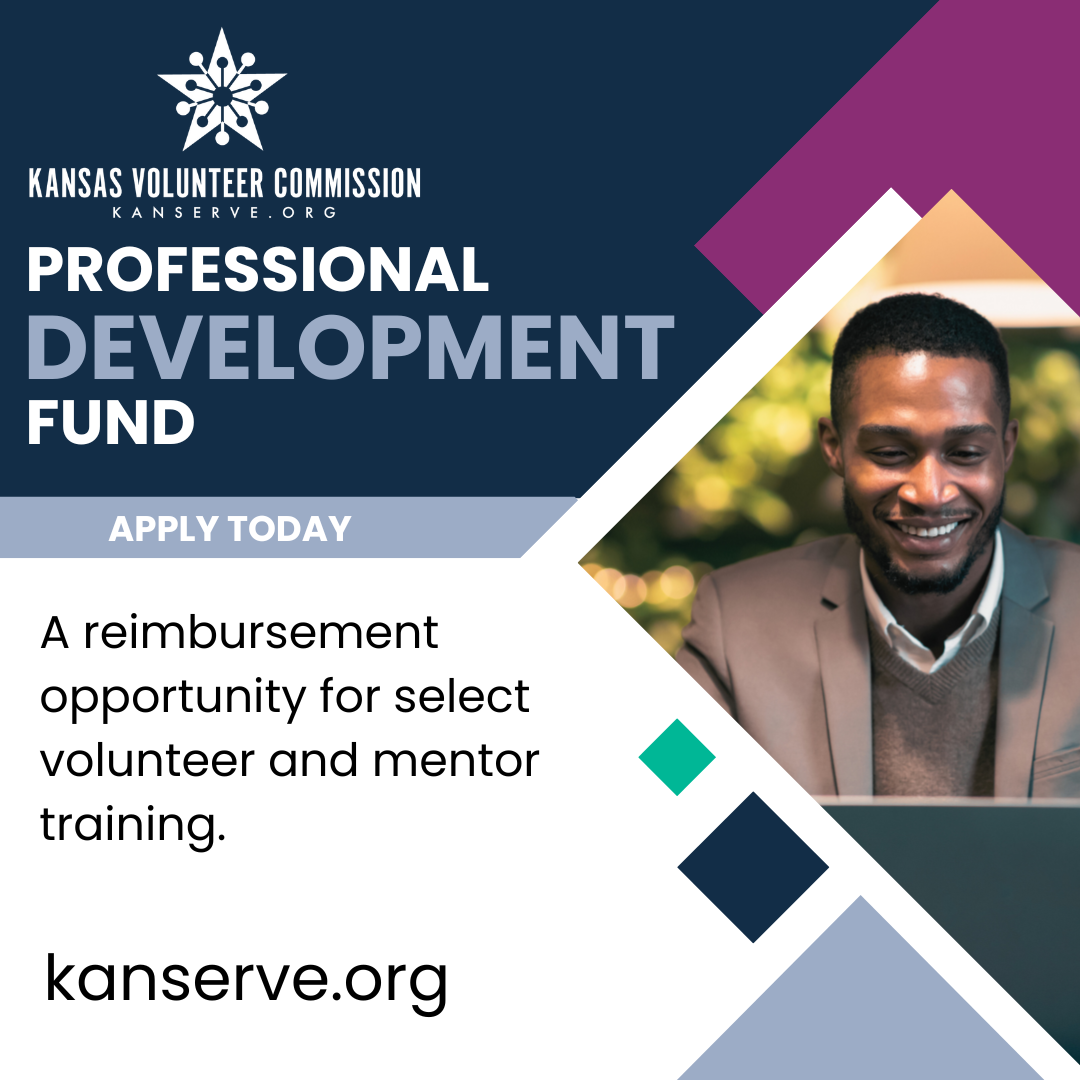graphic-(2).png?sfvrsn=f011b467_1) AmeriCorps Kansas has two applications available for the 2025-2026 grant period. Read the descriptions below to learn more about which grant opportunity is right for your organization, and then click on the link to access the application materials:
AmeriCorps Kansas has two applications available for the 2025-2026 grant period. Read the descriptions below to learn more about which grant opportunity is right for your organization, and then click on the link to access the application materials:
AmeriCorps Kansas Operational Grant: This grant is for organizations interested in operating an AmeriCorps program in Kansas. This grant DOES require matching funds. Applicants must request a minimum of three Member Service Years (MSY).
OPTIONAL: December 13, 2024: This is the due date for initial applications that desire a review by Kansas Volunteer Commission Staff. Applicants will have an opportunity to rewrite their applications after receiving feedback and will resubmit by January 31, 2025.
AmeriCorps Kansas Planning Grant: This grant is for organizations interested in a 12-month planning period to develop an operational AmeriCorps program in Kansas. This grant DOES require matching funds. Due date: Tuesday, January 31, 2025.
All application materials must be emailed to volunteer@ksde.org by January 31, 2025.
Apply now: here
Dr.
Martin Luther King, Jr. once said, “Life’s most persistent and urgent question
is: ‘What are you doing for others?’” Each
year, Americans across the country answer that question by coming together on
the King Holiday to serve their neighbors and communities. The MLK Day of
Service
is a part of the AmeriCorps national call to service initiative.
The MLK Day of Service empowers individuals, strengthens communities, bridges
barriers, creates solutions to social problems, and moves us closer to Dr.
King’s vision of a beloved community.
These mini-grants offer eligible entities grant funding to effectively recruit and engage volunteers in meaningful service activities OR to deliver a service-learning activity that relates to Dr. King. A service-learning activity is a teaching and learning strategy that integrates meaningful community service with instruction and reflection to enrich the learning experience, teach civic responsibility and strengthen communities. Preference will be given to applicants that engage one other community partner in the planning, collaboration, or execution of the event. Service activities should engage a minimum of 10 volunteers and paid staff may not count as volunteers.
Guidelines and Application available here!

The Kansas Volunteer Commission professional development fund is for volunteer, mentor and/or AmeriCorps staff to access reimbursable professional development around volunteerism and mentoring. This opportunity is only available to individuals who work in Kansas for a Kansas-based organization focused on volunteerism, youth mentoring or AmeriCorps national service.
Interested individuals will fill out the Professional Development Fund Request Form. Request Forms must be submitted no later than two weeks before the professional development opportunity begins. Submission of this form does not constitute approval of the request. Applicants will receive an email from the Commission approving or disapproving the request within two business days.
Applicants may receive reimbursement for one professional development opportunity per calendar year. A maximum of two individuals will reimbursed from each organization per professional development opportunity.
This is a cost-reimbursement fund. Approved participants will pay for their travel and registration costs up front. These expenses must be paid for with non-AmeriCorps funds. After the event, participants will submit receipts to the Commission for 50% reimbursement of SOME of their expenses. A check will be mailed within two weeks following the submission of receipts and shared learnings (see below).
Reimbursable expenses include:
Reimbursable expenses DO NOT include mileage or per diem (no food cost covered) or any other expenses not specified above.
Only the following Professional Development opportunities may be reimbursed:
The deadline to apply for these professional development opportunities is as follows:
Following the professional development opportunity, participants will be required to share what they have learned with the Commission. These remarks and any submitted photos may be used in newsletters and social media promotions.
If you have any questions or need clarification, please reach out to volunteer@ksde.org
 The Give Back Kansas Challenge is an eight-week challenge that engages Kansans in employer-supported volunteering, both during and outside the workday. The Kansas Volunteer Commission and Volunteer Kansas are excited to co-partner in this challenge because much research shows the connection between employer-supported volunteering and improved employee engagement, employee wellness, organizational commitment, job satisfaction, and retention. There is also research connecting employee engagement with increased profitability and productivity.
The Give Back Kansas Challenge is an eight-week challenge that engages Kansans in employer-supported volunteering, both during and outside the workday. The Kansas Volunteer Commission and Volunteer Kansas are excited to co-partner in this challenge because much research shows the connection between employer-supported volunteering and improved employee engagement, employee wellness, organizational commitment, job satisfaction, and retention. There is also research connecting employee engagement with increased profitability and productivity.
Employers will be divided into three categories based on the number of entries received and company size (large, medium, and small). Winners will be selected by determining the average number of volunteer hours per employee completed during the challenge period (total volunteer hours ÷ total employees). The leaderboard will be updated every Thursday. Employers achieving the highest average in each size category will be awarded a $1,000 donation to a nonprofit of their choice.
Follow the challenge on our social media channels or the leaderboard page.
WINNERS:
Large Category: Flint Hills Volunteer Center
Medium Category: Bethel Life Center
Small Category: Cloud County, KS Government

Civic Engagement is composed of individual and collective actions to identify and address issues of public concern. Civic engagement can take many forms, from individual volunteerism to organizational involvement to electoral participation. It can include efforts to directly address an issue, work with others in a community to solve a problem or interact with the institutions of representative democracy. Civic engagement encompasses a range of specific activities such as working in a soup kitchen, serving on a neighborhood association, writing a letter to an elected official, or voting. Indeed, an underlying principle is that an engaged citizen should have the ability, agency, and opportunity to move comfortably among these various types of civic acts.
Source: Michael Delli Carpini, Director, Public Policy, The Pew Charitable Trusts (apa.org)

Mentoring is a consistent and stable relationship between youth and a caring role model(s) that involves regular, ideally face-to-face contact and is focused on building the character, capabilities, and confidence of the mentee(s). Mentoring can be formal in the form of one-to-one, group, peer, community, school, faith-based, or mentoring that happens informally daily. Mentoring is one way for individuals to give youth another person who cares about them, who assures them they are not alone in dealing with day-to-day challenges, and someone who makes them feel like they matter.
Source: MentorKansas
_edited.jpg?Status=Master&sfvrsn=52bba4cb_1)
America was founded on a promise of opportunity. When we build stronger communities, we help make this promise a reality for everyone to succeed. Especially in times of adversity, we find the courage to unite and overcome. We are supporting our communities, helping them prosper, head-on and together. It is what AmeriCorps is built for: bringing all Americans together—working alongside each other to improve every community—ensuring that everyone gets the help they need and the opportunities they deserve. AmeriCorps is your chance to be a part of something bigger.
Source: AmeriCorps.gov

People the world over engage in volunteerism for a great variety of reasons: to help to eliminate poverty and to improve essential health and education, to tackle environmental issues, to reduce the risk of disasters, or to combat social exclusion and violent conflict. In all these fields, volunteerism makes a specific contribution by generating well-being for people and their communities. Volunteers are motivated by values like justice, equality, and freedom. A society that supports and encourages different forms of volunteering is likely to be one that also promotes its citizens' well-being.
Source: Unv.org/power-volunteerism